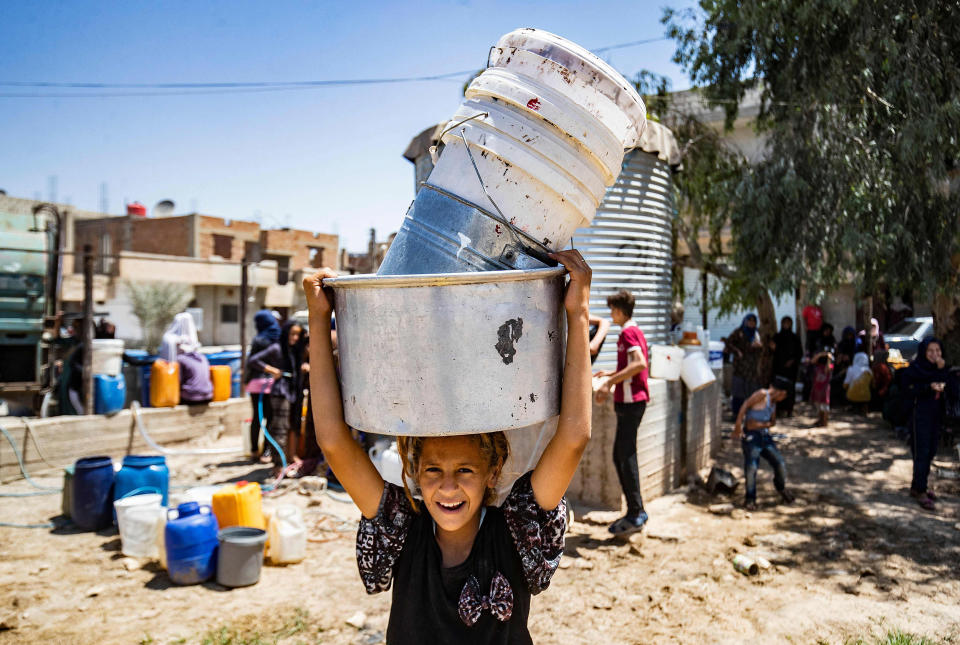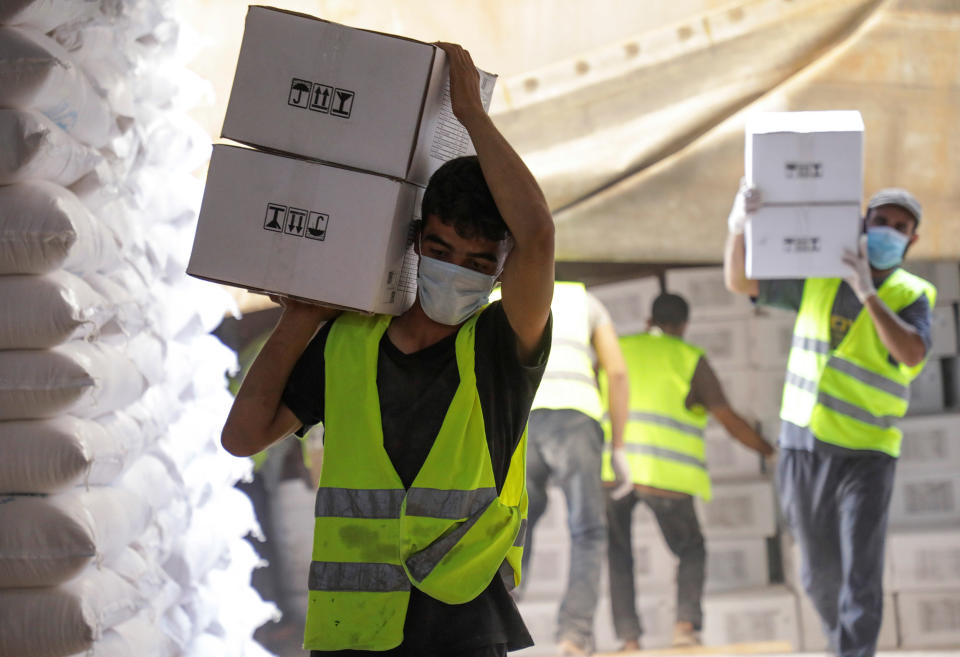U.S.-Russia ties are at historic lows, and millions of Syrians could have paid the price
- Oops!Something went wrong.Please try again later.
Far removed from the lakeside Swiss mansion where Presidents Joe Biden and Vladimir Putin met last month, rock-bottom relations between Washington and Moscow could have had life-or-death consequences Friday for the world's most vulnerable people thousands of miles away.
But the United States, Russia and other members of the United Nations Security Council voted unanimously to maintain a humanitarian aid corridor into Syria from Turkey — a move the U.N. said will provide lifesaving aid to 3.4 million people in desperate need of food and other assistance.
The current one-year mandate for aid through the Bab al-Hawa crossing to northwest Idlib was set to expire Saturday and the resolution authorizes aid deliveries through it for six months until Jan. 10, 2022.
"Thanks to this resolution, millions of Syrian can breathe a sigh of relief tonight," the U.S. ambassador to the United Nations, Linda Thomas-Greenfield, told the council after the vote, adding, "The humanitarian agreement we've reached here will literally save lives."
Had the vying world powers failed to reach an agreement, Syrian civilians would have gone without food, medicine and other supplies. Aid agencies had warned that many would not survive.
"If they close the crossing, people will die," Mohamed Salam Khan, 45, who sells fruit and vegetables at a market in the rebel-held enclave of Idlib, said ahead of the vote.
"Everything comes through the crossing," he said, adding that people felt "under a siege from everywhere" and that "people are exhausted."

Syria's civil war erupted in 2011 and has claimed at least 380,000 lives, according to the Syrian Observatory for Human Rights, a British-based monitoring group. The fighting has left large parts of the country in ruins, displacing more than 13 million people internally and abroad, with the same number inside the country now in constant need of humanitarian assistance to survive.
International backers have lined up behind different sides in this multifaceted conflict. Russia and Iran have backed Syrian President Bashar al-Assad, while the U.S. and some of its allies have at various points given their support to the rebel groups and the Kurdish and Arab militias opposing him.
Assad's forces have now exerted their control over much of the country, though Kurds, Turkish-backed rebels and jihadist fighters still hold some areas in the north.
In 2019 and 2020, Russia and China vetoed a series of Security Council resolutions that would have kept open other border points allowing supplies to pass into Syria. Only the Bab al-Hawa crossing remains.
A resolution drafted by Ireland and Norway proposed to extend the mandate by 12 months. Russia proposed its own text suggesting a six-month extension.
Any plan must win nine votes from the 13 Security Council members. And any permanent member — the U.S., Russia, China, the United Kingdom and France — can veto a proposal outright.
All 15 members of the Security Council agreed on Russia's compromise resolution that was unanimously approved.

"The dispute over the humanitarian crossing is part of a broader Russian attempt to say: The war is over, our man has won, and Western powers need to negotiate directly with Assad in Damascus," said Jonathan Eyal, international director at the Royal United Services Institute, a think tank in London.
"The idea of sending aid to the Syrian population but bypassing the Syrian government is unacceptable to Russia," he added.
Had the vote not passed, people would have gone without food and the hospitals that are still managing to operate would have risked running out of even basic supplies. It would also have imperiled the fragile Covid-19 vaccination campaign that has seen tens of thousands of doses delivered to the northwest despite the conflict.
"The situation is already quite dire," Juliette Touma, regional chief of communications for UNICEF, the U.N. children's aid agency, said ahead of the vote. "We are dreading reaching that situation" where the border crossing agreement expires, she added. "These are some of the world's most vulnerable people — if not the most vulnerable."
In an interview with NBC News’ Andrea Mitchell at the Bab al-Hawa crossing last month, Thomas-Greenfield said she felt "a sense of desperation" witnessing what was happening there.
"I spoke to a number of NGOs," she said, referring to nongovernmental organizations, "and they talked about the desperation of people on the other side of the border, and that they know that if this does not continue, that they stand a chance of dying."
Russia says these crossings violate Syria's territorial sovereignty and integrity.
Alexander Lavrentyev, Putin's special envoy for Syria, on Wednesday called the crossing "an anachronism," according to Russian state media. "Of course, the international humanitarian law should be respected, and normal operations of this mechanism should be restored via the legitimate authorities, via Damascus."
Biden raised the issue with Putin at their meeting last month, with the U.S. president urging him to keep aid moving "so that we can get food — just simple food and basic necessities to people who are starving to death," he said afterward.
Putin did not mention that aspect of the talks. But U.S. national security adviser Jake Sullivan told reporters that it was a "constructive conversation" between Biden and Putin.

